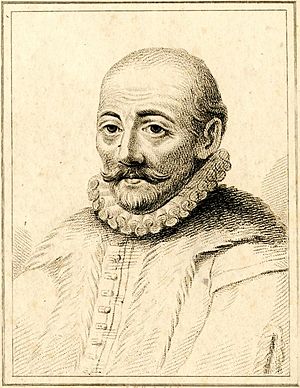William Patten (historian) facts for kids
William Patten (around 1510 – after 1598) was an English writer, scholar, and government official. He lived during the time of King Edward VI and Queen Elizabeth I.
Contents
Early Life and Work
William Patten was born in London around 1510. His father, Richard Patten, worked with cloth. William's grandfather was the brother of William Waynflete, who became a bishop.
Patten likely went to Gonville Hall at Cambridge University. From 1528, he worked as a church helper and clerk at St Mary-at-Hill church in London.
In 1544, Patten worked in France as a secretary for the Earl of Arundel.
Reporting on a Military Trip
In 1547, Patten joined the army of Duke of Somerset on a trip to Scotland. He was chosen by the Earl of Warwick to be a judge for the army.
Patten wrote about his experiences on this trip. He said that he and William Cecil (who later became a very important advisor to Queen Elizabeth) had time to see what was happening and write notes. Patten later used Cecil's notes to help him remember details for his book.
In 1548, Patten published his book called The Expedition into Scotland of the Duke of Somerset. This book told the story of the army's journey. Other historians, like Raphael Holinshed, later used Patten's book in their own writings.
Working for the Government
In July 1548, Patten was given a job collecting taxes on goods coming into London. The next year, he rented a large estate called Stoke Newington. He renewed this rental agreement in 1565 for 99 years.
Patten also fixed up the manor house and the Church of St Mary in Stoke Newington in 1563. He added a special room for church clothes, an aisle, a private chapel, and a schoolhouse. He also worked as a Justice of the Peace for Middlesex, helping to keep law and order. In 1558, he became a main collector of money for the government in Yorkshire.
Financial Difficulties
In 1562, Patten was given a job for life as a teller for the Exchequer, which was like the government's bank. However, in 1567 or 1568, a lot of money went missing from his account. About £7,928 was gone.
Patten was suspended from his job in January 1568. He later lost this position and all his other public jobs. He also lost the rental agreement for Stoke Newington in 1571. In 1572, Patten wrote to the Queen, saying he had to sell all his land and belongings. He blamed one of his servants for the missing money and asked for an investigation, but there is no record that one happened.
Becoming a Scholar and Writer
After losing his jobs, Patten focused on studying and writing. In 1570, he created a vocabulary and alphabet for an Armenian book of psalms. This was the first work about that language in England.
His next book, published in 1575, was called The Calendar of Scripture. It listed names from the Bible in different languages and translated them into English.
Patten also wrote poems. In 1583, he translated Psalm 72 into poetry, and in 1598, he did the same for Psalm 21. Both were printed on single sheets of paper. He also wrote poems praising people he had worked for, like the Earl of Arundel and Sir William Winter. He also wrote about Sir Christopher Hatton, who was a high-ranking official.
Some people believe Patten also wrote the "Langham letter." This letter gave a lively description of a big party hosted by the Earl of Leicester for Queen Elizabeth at Kenilworth Castle in 1575. We know Patten did write some verses for this event.
Patten was an early member of the Society of Antiquaries, a group interested in old things. He wrote about "sterling money" for them. The historian John Stow called Patten a "learned Gentleman and grave citizen." Stow also said Patten wrote a book to the Mayor of London, complaining about illegal land enclosures. Another writer, Thomas Newton, praised Patten as a famous historian.
Patten's exact death date is not known. He was mentioned as "now living" in 1587, and his last known work was published in 1598.
Family Life
Patten's first wife died in 1549. He then married Anne, the daughter of Richard Johnson. In his book The Calendar of Scripture, Patten described himself as "unfortunate Patten … the sorrowing father of seven children." All of his seven children were from his second marriage.
Images for kids
 | George Robert Carruthers |
 | Patricia Bath |
 | Jan Ernst Matzeliger |
 | Alexander Miles |



